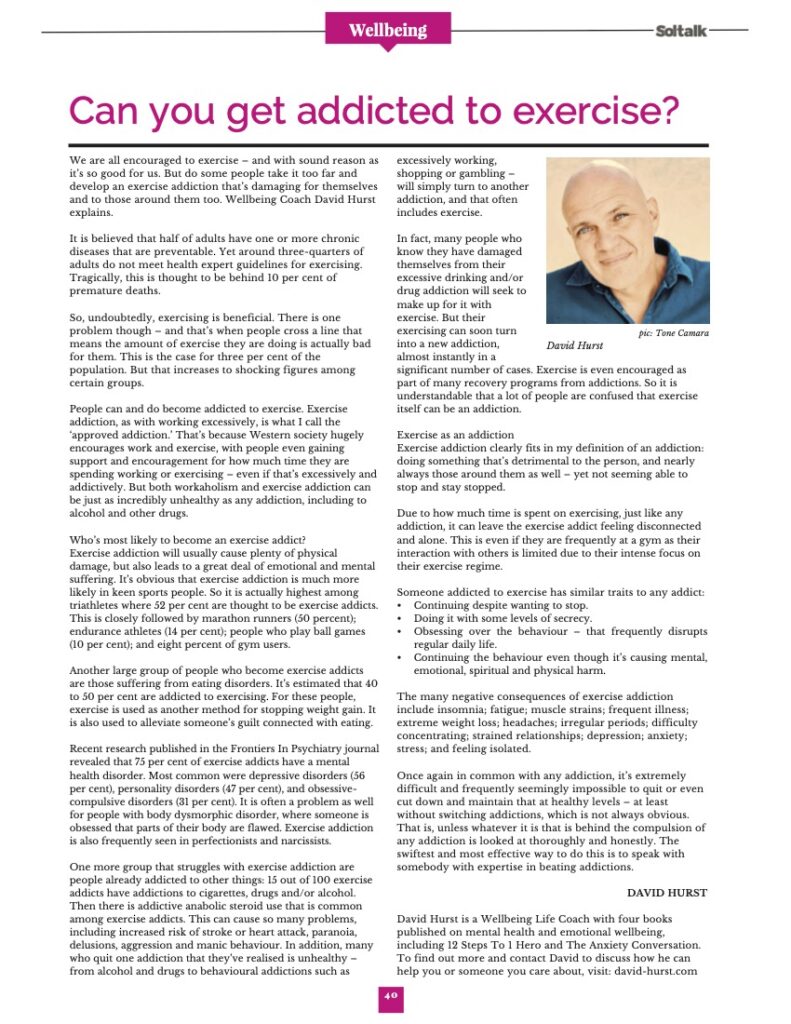Can someone get addicted to exercise?

We are all encouraged to exercise – and with sound reason as it’s so good for us. But do some people take it too far and develop an exercise addiction that’s damaging for themselves and to those around them too?
It is believed that half of adults have one or more chronic diseases that are preventable. Yet around three-quarters of adults do not meet health expert guidelines for exercising. Tragically, this is thought to be behind 10 per cent of premature deaths.
So, undoubtedly, exercising is beneficial. There is one problem though – and that’s when people cross a line that means the amount of exercise they are doing is actually bad for them. This is the case for three per cent of the population. But that increases to shocking figures among certain groups.
People can and do become addicted to exercise. Exercise addiction, as with working excessively, is what I call the “approved addictions”. That’s because Western society hugely encourages work and exercise, with people even gaining support and encouragement for how much time they are spending working or exercising – even if that’s excessively and addictively. But both workaholism and exercise addiction can be just as incredibly unhealthy as any addiction, including to alcohol and other drugs.
Who’s most likely to become an exercise addict
Exercise addiction will usually cause plenty of physical damage, but also leads to a great deal of emotional and mental suffering. It’s obvious that exercise addiction is much more likely in keen sports people. So it is actually highest among triathletes where 52 per cent are thought to be exercise addicts. This is closely followed by marathon runners (50 percent); endurance athletes (14 per cent); people who play ball games (10 per cent); and eight percent of gym users.
Another large group of people who become exercise addicts are those suffering from eating disorders. It’s estimated that 40 to 50 per cent are addicted to exercising. For these people, exercise is used as another method for stopping weight gain. It is also used to alleviate someone’s guilt connected with eating.
Recent research published in the Frontiers In Psychiatry journal revealed that 75 per cent of exercise addicts have a mental health disorder. Most common were depressive disorders (56 per cent), personality disorders (47 per cent), and obsessive-compulsive disorders (31 per cent). It is often a problem as well for people with body dysmorphic disorder, where someone is obsessed that parts of their body are flawed. Exercise addiction is also frequently seen in perfectionists and narcissists.
One more group that struggles with exercise addiction are people already addicted to other things: 15 out of 100 exercise addicts have addictions to cigarettes, drugs and/or alcohol. Then there is addictive anabolic steroid use that is common among exercise addicts. This can cause so many problems, including increased risk of stroke or heart attack, paranoia, delusions, aggression and manic behaviour. In addition, many who quit one addiction that they’ve realised is unhealthy – from alcohol and drugs to behavioural addictions such as excessively working, shopping or gambling – will simply turn to another addiction, and that often includes exercise.
In fact, many people who know they have damaged themselves from their excessive drinking and/or drug addiction will seek to make up for it with exercise. But their exercising can soon turn into a new addiction, almost instantly in a significant number of cases. Exercise is even encouraged as part of many recovery programs from addictions. So it is understandable that a lot of people are confused that exercise itself can be an addiction.
Exercise as an addiction
Exercise addiction clearly fits in my definition of an addiction: doing something that’s detrimental to the person, and nearly always those around them as well – yet not seeming able to stop and stay stopped.
Due to how much time is spent on exercising, just like any addiction, it can leave the exercise addict feeling disconnected and alone. This is even if they are frequently at a gym as their interaction with others is limited due to their intense focus on their exercise regime.
Someone addicted to exercise has similar traits to any addict:
- Continuing despite wanting to stop.
- Doing it with some levels of secrecy.
- Obsessing over the behaviour – that frequently disrupts regular daily life.
- Continuing the behaviour even though it’s causing mental, emotional, spiritual and physical harm.
The many negative consequences of exercise addiction include insomnia; fatigue; muscle strains; frequent illness; extreme weight loss; headaches; irregular periods; difficulty concentrating; strained relationships; depression; anxiety; stress; and feeling isolated.
Once again in common with any addiction, it’s extremely difficult and frequently seemingly impossible to quit or even cut down and maintain that at healthy levels – at least without switching addictions, which is not always obvious. That is, unless whatever it is that is behind the compulsion of any addiction is looked at thoroughly and honestly. The swiftest and most effective way to do this is to speak with somebody with expertise in beating addictions.
My article for Soltalk magazine.

